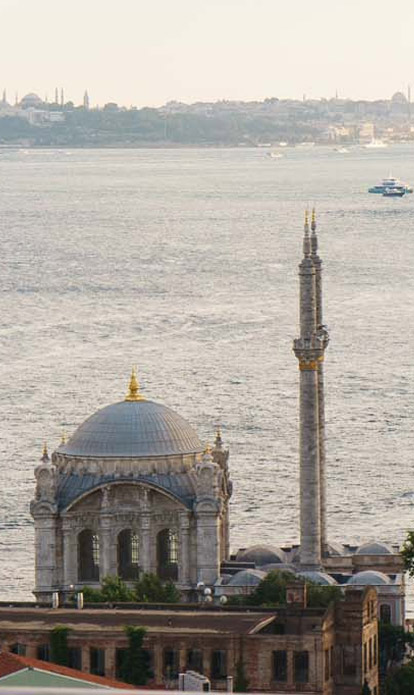
A few suggestions to get the holiday planning process started

Boasting incredible cuisine, stunning scenery and a rich history, Turkey can often feel overwhelming – but that’s where our talented team steps in. We tailor itineraries to your taste and help you get under the skin of the country, from the sunken city of Kekova to lesser-known coastal spots around Fethiye. Foodies can enjoy our gourmet walking tour of Istanbul, while budding historians can marvel at the archaeological site of Ephesus, both accompanied by our personable guides. When it’s time to rest, our hand-picked properties range from historic to contemporary, oozing comfort and views so you can kick back in style.
ENQUIRE NOWDiscover different ways to explore Turkey
Practical advice and inspiration to help you prepare for your holiday
Leave the planning to our travel experts for your next trip to Turkey and dive into the country’s archaeological and geographical wonders. We’ve got the inside scoop on the most exclusive experiences, be it watching the whirling dervishes in Konya or heading deep into the underground city of Kaymakli. Forget about stressing over in-country logistics, as our attentive Concierges are on call to ensure your trip is smooth sailing. What’s more, our knowledgeable guides are here to help you discover Turkey like a local, uncovering secret spots and sharing personal stories.

Turkey is home to one of the Seven Wonders of the World – the Temple of Artemis at Ephesus - but the treasures don’t stop there. Turkey offers a wealth of magical sites: the cascading pools of Pamukkale; the spiralling heights of the fairy chimneys of Cappadocia; Istanbul's glorious Grand Bazaar and the impossibly exotic whirling dervishes. But the story doesn’t stop there. Along the coast, you'll discover sweeping white sand beaches and unreal turquoise waters perfect for cruising; ancient Greek and Roman ruins crumbling in Smyma; and sunken cities dating back to the 4th century near Kekova. Out east there's Gobekli Tepe temple ruins, Armenian heritage aplenty and the iconic stone heads of Nemrut. Wherever you end up, Turkey glitters with delights.
Those seeking lazy waterfront stays should head to the Aegean coast and linger on the shores of Lycia or the Antalya area. Here, you can blend beautiful beach stays with day trips to historic sites and unique landscapes. Meanwhile, art and history lovers will be smitten by the hustle of Istanbul - truly one of the most majestic cities in the world.
Istanbul is a thousand cities in one: a wonderful world of bustling bazaars, shimmering fabrics, glittering lights, and intoxicating spices. From holy mosques to perfectly carved palaces, the bright blues of the Hagia Sophia, and the winding river that cuts Europe and Asia in half – a long weekend or week-long stay is just enough to give you a taste of the world’s most exotic city. Grant yourself another weekend and it’s enough time to cool your feet in the gin-clear waters of Antalya or Bodrum and rub your eyes in disbelief at the blue hues of Marmaris and Oludeniz. With several weeks free to explore the country, you can do it all - visit Istanbul, stroll the sublime site of Cappadocia, and see the archaeological wonders of Aphrodisias on Mount Nemrut in Eastern Turkey.
- Hop aboard a gulet charter yacht and cruise the coast of Lycia for the perfect blend of active discovery and deep relaxation. A bounty of inaccessible coves, ancient ruins and sleepy fishing villages, this is your chance to see a softer side of Turkey. We think a gulet holiday is quite simply one of the best ways to spend a week anywhere in Europe.
- In the heart of Anatolia, unlock the secrets behind the giant statues of Nemrut, celebrated as a UNESCO World Heritage Site.
- Another of the most memorable experiences you can have on your Turkish holidays is staying in a cave hotel hewn from the bizarre rock formations that characterise the Cappadocia region of central Turkey. These are the result of ancient volcanic eruptions that deposited thick layers of soft rock. The forces of nature have, over the ages, sculpted outlandish shapes such as the so-called 'fairy chimneys' - toadstool-like rock pinnacles that litter the valleys and into which humans have, going back centuries, dug homes, churches and even entire underground cities. Some of these subterranean homes have been converted into cave-hotels - chic boltholes that offer everything the modern troglodyte could want.

Our team of destination experts will get to know you and your unique requirements for your holiday

We work with you to build an ultra-personalised holiday itinerary with your choice of accommodation, experiences and activities

All of our holidays include little extras designed to make a big difference to your trip, from fast-tracking you through airport check-in and security to our network of local Concierges